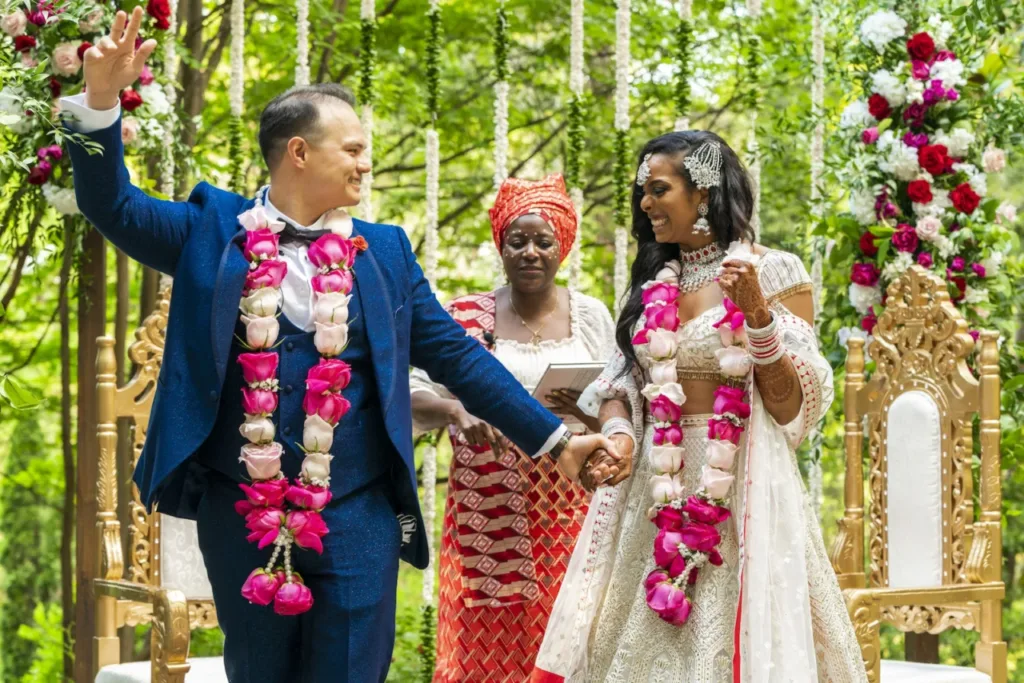Are you in an interracial relationship or know couples in interracial relationships who are struggling to navigate the challenges that come with it? You’re not alone. Many interracial couples face stigmatization, discrimination, and even disapproval from family and friends.
But don’t let these obstacles discourage you from building a healthy and fulfilling relationship with your partner.
We’ll explore how to handle these situations in a way that preserves your relationship and your well-being.
It’s important to acknowledge the discrimination that comes with being in an interracial relationship. Whether it’s from strangers, acquaintances, or even loved ones, discrimination can have a significant impact on your relationship.
It’s crucial to continuously learn about your partner’s culture, history, and traditions. This not only helps you understand and appreciate your partner on a deeper level but also strengthens your bond as a couple.
Building a strong support network of friends, family, and like-minded individuals can also help you and your partner navigate the challenges of being in an interracial relationship.
By following these six essential tips, you can learn how to navigate interracial relationships with confidence and thrive in your partnership.
With these tips, you can create a strong foundation for your relationship and overcome any obstacles that come your way.
Key Takeaways
- Interracial relationships face discrimination and can cause anxiety, stress, and sadness
- Dealing with discrimination requires focusing on your partner’s happiness, exploring cultural differences, and acknowledging each other’s feelings
- Continuous learning is important to embrace racial and cultural differences, recognize microaggressions, and support each other in battles against racial inequality
- A strong support network is crucial for navigating difficult relationships and seeking emotional support, including therapy
- Validate your partner’s experiences but don’t let discrimination derail your relationship.
- Address family disapproval with empathy and by emphasizing your love and commitment. Foster unity in a multicultural family through open discussions.
- Find common ground between different customs and embrace both cultures. Nurture shared values and expectations through communication.
- Seek counseling if you feel anxious, overwhelmed, or unable to communicate effectively.
Dealing With Discrimination in Interracial Relationships
You’ll need to focus on your partner’s happiness and not let others’ opinions heavily influence you when dealing with discrimination in interracial relationships.
It’s important to remember that discrimination can come in many forms, and it’s not always easy to navigate. But there are ways to cope and communication strategies that can help.
One way to deal with discrimination is to explore your partner’s culture. By learning about their traditions and values, you can better understand where they’re coming from and how to support them.
It’s also important to acknowledge your feelings and create an intentionally safe space for communication and healing. By being supportive and giving space to process, you can help your partner feel heard and understood.
Remember, it’s not about minimizing their experiences or pretending like everything is okay, it’s about being there for each other and working through the challenges together.
Address Family Disapproval: Recognize and Address Negative Effects
Family disapproval may be one of the challenges you encounter in your interracial marriage. In such situations, patience and empathy are essential.
By expressing your love for each other, you can bridge the gap and show the depth of your commitment. Over time, family members may come to appreciate the love and happiness shared in your union.
Embrace Cultural Diversity to Overcome Challenges in Your Interracial Marriage
Your interracial marriage offers a beautiful opportunity to embrace cultural diversity. Different customs and cultures may teach varied values and priorities, and that’s okay.
Embrace and appreciate these differences to understand your partner’s heritage better. Instead of bending to fit into preconceived notions, celebrate the uniqueness of your union and find strength in your diversity.
Foster Unity in Your Cross-Cultural Family Through Open Discussions
As a cross-cultural family, unity is cultivated by weaving together the best aspects of each partner’s cultural background. Finding common ground and shared values provides a strong foundation for decision-making and resolving conflicts.
This unity is a testament to the power of love and understanding in transcending cultural barriers.
Navigating interracial relationships in a diverse family has rewards and challenges. Honest talks about unique hurdles and benefits can strengthen your bond.
You may face cultural differences. See them as chances to learn and appreciate backgrounds.
Create an environment where your children can embrace their unique identities confidently. Challenge stereotypes and foster understanding in your family. Emphasize cultural sensitivity as your relationship’s foundation.
Open talks about challenges and benefits foster greater unity in diverse families. By embracing all backgrounds, communicating effectively, and nurturing sensitivity, you can build a harmonious family celebrating its diversity.
Nurturing Shared Values and Expectations in Interracial Marriage
Nurturing shared values and expectations in interracial marriages is a journey of growth, understanding, and love.
Effective communication is essential in any relationship, especially in interracial unions where cultural backgrounds may influence expectations.
Discuss your goals, dreams, and plans, finding common ground between your cultural differences. Mutual understanding will help you navigate challenges and conflicts more effectively.
How to Improve Communication in Interracial Relationships
Candid conversations about where one is lacking can lead to improvement in an interracial relationship by creating a safe space for open communication.
These conversations can involve discussing communication styles and trust building, which are important for any bond, especially in interracial relationships where cultural differences can lead to misunderstandings.
By acknowledging and addressing areas where one may fall short, both partners can work together toward growth and a better understanding of each other’s experiences.
This requires a level of vulnerability and honesty, but it ultimately leads to deeper intimacy and a stronger connection.
It’s important to approach these conversations with empathy, actively listen to each other’s perspectives without judgment, and be open to learning and growth.
Recognizing boundaries and addressing power dynamics are crucial in any relationship, but they can be particularly complex in interracial relationships.
If you’re feeling overwhelmed, anxious, or sad, seeking therapy can be a helpful resource for emotional support. A therapist can provide a safe space for you to express your emotions and work through any challenges that may arise.
By taking care of yourself and addressing any underlying issues, you can strengthen your bond with your partner and build a healthier, happier relationship.
Continuous Learning in Key in Interracial Relationships
To fully embrace and understand your partner’s culture and experiences, continuously learn about racial and cultural differences and seek emotional support outside of the relationship.
Engaging in learning strategies can lead to an enriched cultural exchange between partners.
Here are a few tips to help you continuously learn and grow in your interracial relationship:
- Ask questions and be open to learning: Don’t be afraid to ask your partner about their culture and experiences. Be curious and open-minded about learning new things.
- Read literature and have raw conversations: Educate yourself about your partner’s roots, heritage, and cultural traditions. Engage in candid conversations that challenge both of your perspectives.
- Recognize and address microaggressions and subtle racism: Be aware of subtle forms of discrimination and racism that may be present in your everyday interactions. Take the time to address them and learn from those experiences.
By continuously learning about racial and cultural differences and engaging in meaningful cultural exchange, you can build a stronger and more understanding relationship with your partner.
Remember to seek emotional support outside of the relationship and be open to learning new things to create a more enriching experience for both you and your partner.
Have a Support Network When Dealing With the Challenges of Interracial Relationships
Having a strong support network is crucial when dealing with the challenges and discrimination that can arise in interracial relationships.
Surround yourself with people who are supportive of your relationship and who understand the unique struggles that come with it.
Negativity toward your relationship can take a toll on your mental health, so having a support system in place can help alleviate some of that stress.
Build trust within your support network. You want to make sure that you can rely on these people to be there for you and your partner, regardless of any outside opinions or judgments.
This can include friends, family members, or even a therapist.
Don’t be afraid to seek out emotional support from those around you, as it can make all the difference in maintaining a healthy and happy relationship.
Raising Multiracial Children in Interracial Families
Raising multiracial children comes with its complexities, as they navigate their diverse heritage and cultural backgrounds.
In interracial families, some children may face discrimination, teasing, whispers, and stares. It is essential to address these challenges and foster a strong sense of self-identity and pride in your children.
If you decide to have children, raising them in a multiracial family can be a rewarding yet challenging experience. Create a supportive environment where they can explore their identity and cultural heritage.
Celebrate the diversity within your family, and provide guidance to help them embrace and value their unique background.
Encourage Multicultural Friendships and Interracial Relationships
As parents in an interracial relationship, you can play an active role in guiding your children toward embracing diversity through friendships.
Encouraging diverse friendships for your children allows them to appreciate different cultures and backgrounds. Exposing your kids to a diverse group of family and friends enriches their perspectives and fosters a harmonious environment.
Here are some tips:
- Expose them to diverse books, shows, and media representing various races, cultures, and backgrounds. This helps normalize diversity.
- Seek out events and activities in your community that bring together families of different races, ethnicities, religions, etc. Attend multicultural fairs, festivals, and potlucks.
- Encourage playdates and sleepovers with classmates and neighbors from different backgrounds. Being friends at a young age can build lifelong bonds.
- Lead by example. Let your children see you nurturing meaningful friendships across cultural lines.
- Teach them to be open-minded and curious about other cultures. Answer their questions honestly.
By surrounding your children with diverse friendships and perspectives from a young age, you equip them to become compassionate, culturally aware adults in an increasingly interconnected world.
Maintaining a Healthy Interracial Relationship
Interracial relationships blend beautiful cultures but it comes with challenges. With understanding, communication, and proactive strategies, you can maintain a strong bond.
You may encounter cultural differences. Embrace diverse traditions and learn to navigate the journey together. Varying communication styles may exist too – open dialogue is key. Build resilience against societal judgments and prioritize your love.
Focus on shared values, honest communication, and empathy. Address prejudice calmly by educating others. Build a support system. Celebrate your unique identity as a mixed-race couple.
Know challenges exist but there are also broad benefits like new worldviews, cultural enrichment, and promoting progress. Explore both advantages (growth, learning) and disadvantages (judgments). Foster cultural sensitivity.
An interracial relationship takes effort but brings rewards too. By addressing challenges, celebrating benefits, and nurturing love, you can create a resilient partnership thriving in a diverse world.
Conclusion
It’s important to acknowledge that there may be challenges ahead, but with the right mindset and support, you can overcome them.
Remember to always communicate with your partner and prioritize your relationship above outside opinions.
While discrimination may still exist, it’s important to approach it with grace and understanding. Use it as an opportunity to educate others and advocate for your relationship.
Continue to learn about each other’s cultures and backgrounds, and celebrate the differences that make your relationship unique.
Lastly, build a strong support network that includes friends and family who accept and embrace your relationship.
Navigating an interracial relationship may not always be easy, but it’s worth it.
By following these tips and staying committed to each other, you can create a healthy and fulfilling relationship. Embrace the journey and enjoy the love you’ve found.
Frequently Asked Questions
How can microaggressions and subtle racism be recognized and addressed in interracial relationships?
Microaggressions can often be subtle and unintentional, making it difficult to identify and address them. However, by using euphemistic language, you can visually represent the impact of these actions and words.
It’s important to educate yourself about racial and cultural differences and to seek emotional support outside of your relationship. By working together, you can support each other in battles against racial inequality and improve your relationship.
What are some effective ways to learn about one’s partner’s roots, heritage, and cultural traditions?
Food exploration is an excellent way to experience a culture’s cuisine and learn about its culinary traditions. Try cooking together or going out to restaurants that specialize in your partner’s cultural cuisine.
Travel experiences can also provide an opportunity to learn about your partner’s culture by visiting places that are significant to them.
Additionally, reading literature and watching films that highlight your partner’s culture can be an informative way to learn more. However, it’s important to approach these activities with respect and an open mind.
Remember, your partner is the expert on their culture, and it’s essential to seek their guidance and understanding.
How can partners support each other in their battles against racial inequality?
Supporting activism in the battle against racial inequality can be a challenging journey for partners in an interracial relationship, especially when dealing with family members who may not be as accepting of the relationship.
However, it’s important to acknowledge and understand the impact of racial discrimination and actively support each other in advocating for change.
This can include attending protests, educating oneself on the issues, and having difficult conversations with family members who may hold discriminatory beliefs.
How can I be there for my partner when they experience racism in public?
Public racism can be stressful and emotionally taxing for your partner. As their ally, listen without judgment when they share their feelings. Validate their emotions and don’t minimize their experience.
If you witness racism against your partner, speak up to defend them if it’s safe to do so. Provide comfort after the incident and remind them the racist person’s actions reflect badly on them, not your partner.
Seek counseling together if your partner needs help processing their trauma. Your support reminds them they don’t have to face racism alone.
What are some positive ways to respond when my family disapproves of my interracial relationship?
If your family disapproves of your interracial relationship, avoid reacting defensively or letting their prejudice impact your self-worth.
Recognize their stance likely stems from cultural differences versus personal attacks against you or your partner. Share how important your partner is to you and the depth of your bond.
Highlight your shared values and vision for the future. With time and exposure to your healthy dynamic, your family may open their minds. If tensions persist, limit contact to protect your peace. Focus on your love, not outside disapproval.





